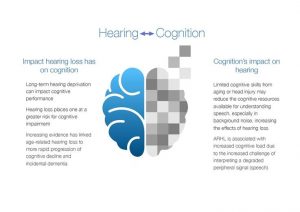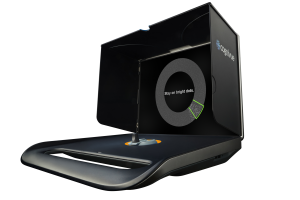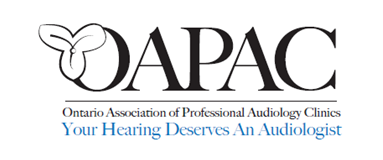Cognitive Screenings: Cognivue Thrive
 Cognitive impairment and dementia are a growing concern. Patients and families are seeking help to understand and manage cognitive aging. Hearing issues are an important risk factor for cognitive impairment. Optimal hearing testing for aging patients is closely related to appropriate functional communication and engagement. We can go beyond testing hearing sensitivity (i.e., traditional audiogram) and assess cognitive processes that are key to understanding speech as well. This way we provide a more comprehensive management strategy for age-related hearing loss.
Cognitive impairment and dementia are a growing concern. Patients and families are seeking help to understand and manage cognitive aging. Hearing issues are an important risk factor for cognitive impairment. Optimal hearing testing for aging patients is closely related to appropriate functional communication and engagement. We can go beyond testing hearing sensitivity (i.e., traditional audiogram) and assess cognitive processes that are key to understanding speech as well. This way we provide a more comprehensive management strategy for age-related hearing loss.
Increasing evidence has linked age-related hearing loss with more rapid progression of cognitive decline and incidental dementia. Recent literature1,2,3 show that individuals with hearing loss had a 55% greater risk of developing dementia compared to those with normal hearing, and it increased linearly with the severity of hearing loss. Long-term hearing deprivation of auditory inputs can impact cognitive performance by decreasing the quality of communication leading to social isolation and depression and facilitate dementia. On the other hand, limited cognitive skills may reduce the cognitive resources available for auditory perception, increasing the effects of hearing loss.
 For our cognitive screenings, many OAPAC clinics are using Cognivue Thrive, which is the only computerized cognitive assessment based on the same FDA-cleared technology used by neurologists and other physicians for cognitive evaluation. Health Canada cleared the device for medical use in December of 2021.
For our cognitive screenings, many OAPAC clinics are using Cognivue Thrive, which is the only computerized cognitive assessment based on the same FDA-cleared technology used by neurologists and other physicians for cognitive evaluation. Health Canada cleared the device for medical use in December of 2021.
The results obtained from the Cognivue Thrive are comparable to those obtained by the Montreal Cognitive Assessment Test (MoCA).4 Cognivue Thrive has been shown through clinical validation to be as equally effective as the MoCA. The advantage of the Cognivue Thrive is that is does not rely on verbal administration. Administration of the MoCA, like other cognitive screeners such as the Mini Mental State Examination (MMSE) and the Saint Louis University Mental Status Examination (SLUMS), rely on verbal administration, placing patients with hearing loss at a disadvantage and potentially skewing results for this patient population.
“The screening is completed on a laptop like device and all instructions are provided auditorily as well as via closed captioning on the screen. Practice sessions are provided throughout the test, ensuring accurate understanding of the tasks prior to completing the screening, yet not affecting the outcome of the screening results because the content cannot be learned. The screening tool consists of testing 3 cognitive domains including memory, visuospatial, and executive function and 2 performance tests assessing reaction time and speed processing abilities. The Cognivue technology was designed to reduce the impact of education, ethnicity, auditory acuity, and familiarity of the English language”.5
Cognivue Thrive is a cognitive screening and not a standalone diagnostic tool. Test results cannot be interpreted on their own as there may be additional underlying conditions affecting a patient’s cognitive abilities such as cardiovascular and/or metabolic conditions, sleep disorders, hormonal imbalances, depression, chronic pain, post-concussion, post-stroke, multiple sclerosis, epilepsy, Parkinson’s disease, ADHD, autism, and neurological, focal, vision and hearing impairment, or chronic conditions such as type-2 diabetes.
All patients who undergo a Cognivue Thrive screening have access to a 60 minute session with a cognitive wellness coach. This is a free additional resource that can provide answers and recommendations based on the Cognivue screening results. Healthcare providers and patients are encouraged to use this service to be further informed, educated, and aware of evidence-based recommendations available to help optimize brain health and overall quality of life.
If you are a physician or health care provider wanting more information about the Cognivue Thrive, please visit the Cognivue website.
- Fortunato S, Forti F, Guglielmi V, De Corso E, Paludetti G, Verrettini S, Fetoni, A. A review of new insights on the association between hearing loss and cognitive decline in ageing. ACTA Otorhinolaryngologica Italica 2016;36:155-166.
- Lin FR, Yaffe K, Xia J, et al: Health ABCStudy Group. Hearing loss and cognitive decline in older adults. JAMA Intern Med. 2013:173(4):293-299.
- Loughrey DG, Kelly ME, Kelley GA, Brennan S, Lawlor BA. Association of age-related hearing loss with cognitive function, cognitive impairment and dementia: a systematic review and meta-analysis. JAMA Otolaryngol Head Neck Surg 2018; 144(2): 115-126. 3.
- Ma F, Cahn-Hidalgo D (2021) Clinical Validation of Cognivue – A Computerized Alternative to the Montreal Cognitive Assessment Test. Neurol Sci Neurosurg, Volume 2:2. 116.
About the Author:

Bernice A. McKenzie has been practicing Audiology for over a decade. She grew up in the little town of Brantford, Ontario before moving to Ottawa to complete her undergraduate degree in Linguistics. She then moved to the Windsor, Ontario to obtain her doctorate. She was part of the first graduating class of Doctors of Audiology at Wayne State University in Detroit, Michigan. She is registered with the College of Audiologists and Speech Language Pathologists of Ontario (CASLPO). She owns clinics in the towns of Amherstburg, Essex and LaSalle. To learn more about her clinics, feel free to visit her website:


